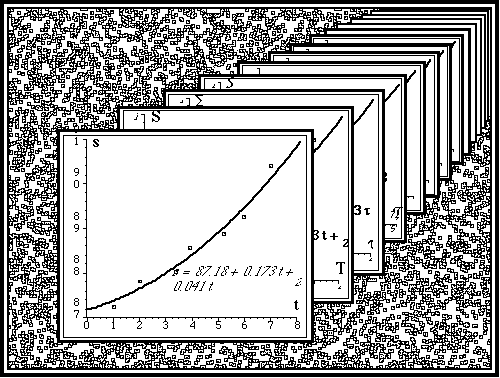
This transdisciplinary work proposes a cross-fertilization between cognitive science and theoretical physics, within a framework inspired by systems theory. Cognitive science concepts are applied in an epistemological analysis of physical theories, considered as representations of change.
This analysis leads to the basic concept of distinction conservation, which appears necessary and sufficient to demarcate classical representations (classical mechanics) from non-classical ones (quantum mechanics, relativity theory and thermodynamics). It is observed that the most important cognitive and physical processes are non-classical (i.e. do not conserve distinctions), whereas the paradigms used for modelling and interpreting them are basically classical. This anomaly produces conceptual problems, exemplified by the paradoxes of quantum mechanics. The construction of an adaptive metarepresentation is proposed in order to solve these problems. This is a general framework for the representation of not distinction-conserving processes and representation changes. Finally a first sketch of a metarepresentational formalism is presented.
The book is addressed to a broad audience of researchers from different backgrounds. It is written in a style which avoids technicality, explaining difficult mathematical and physical concepts in the most simple way. It will be especially stimulating for philosophers and systems theorists interested in the integration of theories, for cognitive scientists involved in the application of ideas from physics, and for physicists wishing to understand the epistemological foundations of their models.
The electronic version of this book is available as a PDF file (600 Kb), with two pages of the original book per printed A4 page. This format, although it can be read on-screen, is basically meant for printing out. You can read or print it with the  free PDF reader from Adobe. There is also an extended summary of the results available (not part of the book itself). If you prefer, it is probably still possible to order the original book from its publisher.
free PDF reader from Adobe. There is also an extended summary of the results available (not part of the book itself). If you prefer, it is probably still possible to order the original book from its publisher.
Table of Contents
PART I : An Introduction to the Representation Concept and its Relation with Change.
1. Prologue : The Conceptualization of Change
2. The Representation Concept in Physical Science and in Cognitive Science
2.1 Physical Science
2.2 From Physical Science to Cognitive Science
2.3 The Philosophical Theory of Ideas as Representations of
External Objects
2.4 Artificial Intelligence and Knowledge Representation
2.5 AI and Problem Representation
3. Adaptive Representations.
3.1 Representations as an Interface between Mind and Nature.
3.2 Adaptation as Vicarious Selection
3.3 The Thermostat as an Example of an Adaptive Representation
3.4 The Interdependence of Feedback and Feedforward.
3.5 Structures and States of an Adaptive Representation.
3.6 Information-Processing in an Adaptive Representation
4. Making Representations Explicit.
4.1 Scientific Theories as Explicit Representations.
4.2 Formalization and Paradigmatic Structures.
4.3 Operationalization and Empirical Tests.
4.4 The Problem of Transdisciplinarity.
4.5 The Need for a Metarepresentation
PART II : An Analysis and Reconstruction of the Classical Representation Frame
5. The Structure of the Classical Frame
5.1 Introduction
5.2 The Generation of Elementary Expressions
5.3 The Function of Objects and Predicates.
5.4 The Generation of Compound Expressions.
5.5 From Boolean Algebra to State Space
5.6 Topology, Time and Trajectories in State Space
5.7 The Group of Dynamical Operators.
5.8 Dynamical Constraints
6. The World View of the Classical Frame.
6.1 Introduction
6.2 The Ontology of the Classical Frame
6.3 The Epistemology of the Classical Frame
7. Classical and Non-Classical Representations.
7.1 Beyond the Classical Frame.
7.2 Distinctions as Basic Elements of a Representation
7.3 The Invariance of Distinctions in the Classical Frame.
PART III : An Analysis and Reconstruction of some Non-Classical Representations
8. Quantum Mechanics
8.1 The Complementarity of Representations.
8.2 The Structure of the Quantum Formalism.
8.3 A Cognitive-Systemic Interpretation of Quantum Mechanics
8.4 From Classical to Quantum Probability
8.5 Information Transfer during the Observation Process.
9. Space-Time Theories and Causality.
9.1 The Relativity of Reference Frames.
9.2 The Relativity of Simultaneity and Synchronization
9.3 The Invariance of the Causal Structure of Space-Time
9.4 From Local to Global Causal Connections
9.5 Formal Properties of Global Causal Connections
9.6 Non-Locality Paradoxes in Quantum Mechanics.
9.6.1 The Paradox of de Broglie
9.6.2 The EPR Paradox
9.6.3 The Aharonov-Bohm Effect.
10. Irreversible Information Processes : from Statistical Mechanics to Cognitive Psychology
10.1 Introduction
10.2 Irreversibility in Statistical Mechanics
10.3 Self-Organization.
10.4 Autonomy and Adaptation
10.5 Perception and Problem-Solving as Irreversible Processes
10.6 Learning and Discovery as Representation Changes
PART IV : Conclusion : Towards an Adaptive Metarepresentation
11. Summary and Discussion of the Previous Results
11.1 Different Formulations of the Research Problem.
11.2 Lessons Learned by Analyzing Classical Representations.
11.3 The Correspondence between Classical Metarepresentations
and Non-Classical Object Representations.
11.4 Lessons Learned by Analyzing Non - Classical Representations
12. Towards a Formalization and Operationalization of the Theory
12.1 Introduction.
12.2 Distinction Algebras
12.3 Kinematical Constraints for Distinctions.
12.4 Categories of Distinction Algebras
12.5 The Relation between Categorical and Boolean Algebras
12.6 The Dynamics of Distinctions
12.7 Towards an Operationalization of the Theory
Chapter 13 : Formal Deduction of Representation Structures from a Metarepresentational Framework
Introduction
Basic Concepts and Assumptions of the Metarepresentational Framework
The Classical Representation Frame.
The Quantum Mechanical Frame
The Relativistic Frame
The Thermodynamical Frame
Conclusion
Bibliography.

